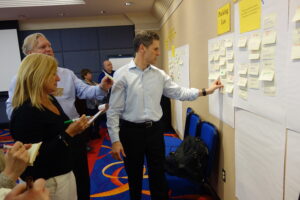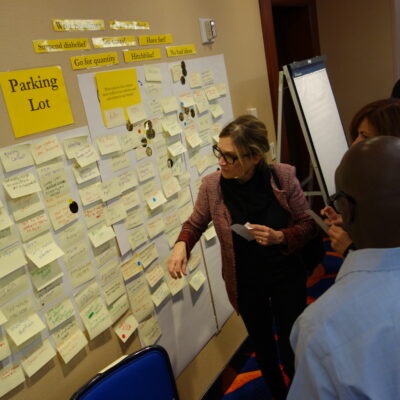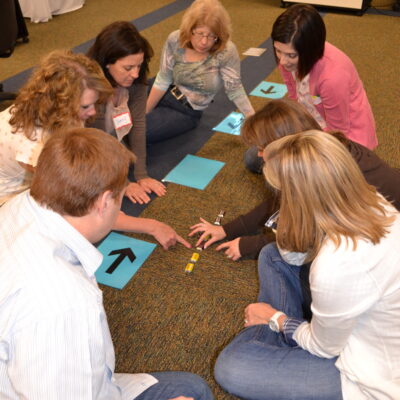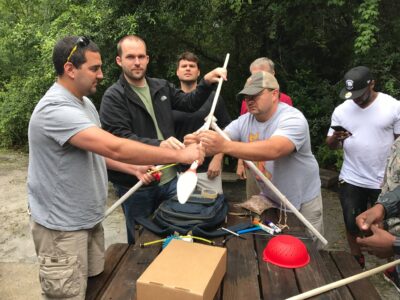High-functioning teams are what every business hopes to build, but it can be a challenging goal to achieve. It is doable, however.
In a recent episode of Team Building Saves the World, How to Have Difficult Conversations, we spoke with social dynamics expert Aden Nepom about the link between performance and psychological safety. She shared a powerful insight, saying:
“It’s not who’s on the team, but it’s how the team functions. And the way to summarize that great team function is that broad term psychological safety, which is largely misunderstood.”
In this guide, we’ll explore what goes into building high-performing teams, attributes of high-functioning teams, and how you can help your crew reach peak performance.
What Is a High-Functioning Team?
Let’s start at the beginning—what is a high-functioning team?
The most obvious answer is that it’s a team that consistently performs well. They’re the ones who get noticed for things like:
- Doing excellent work
- Exceeding expectations
- Accomplishing their goals
- Communicating with efficiency
- Prompting cross-team collaboration
- Innovating and bringing creative ideas to the table
Most leaders often find that members of high-functioning teams also share similar goals, expectations, purposes, and skills, which makes it easier for them to collaborate as a unit and leverage their strengths to achieve their goals.
You might also notice that these teams feature highly adaptable team members who can fill multiple different roles when needed.
In other words, high-functioning teams are dream teams. They’re groups of people who are aligned in many ways, remarkably skilled, and able to overcome their obstacles and achieve their goals through teamwork and communication.
Characteristics of High-Performing Teams
Most high-performance teams have several characteristics in common that enable them to be such strong teams. We’ll examine these qualities in detail below.
Defined Roles and Responsibilities
Team members need to have set roles and responsibilities so they can focus their efforts where they matter most. This also helps ensure that they feel like an expert in at least one aspect of the business, which builds confidence and a sense of belonging.
Clearly-Defined Goals and Priorities
Clearly defining your group’s goals and priorities helps align team members and give them a shared vision to strive for without internal conflict. This helps create a foundation and sets them up to be a strong team that can lift each other up.
Clear and Respectful Communication
Open, honest, clear, and respectful communication is a necessity for teams to operate at their full potential. This should ideally minimize confusion and ensure that employees can handle conflict resolution without getting leadership involved every time.
Healthy Feedback and Recognition
Regular feedback and recognition help team members improve upon their work, better themselves, and get the credit they deserve. This includes constructive criticism—but only when it’s done with tact, mindfulness, and support.
Emotional Intelligence and Trust
Team members with high emotional intelligence are more likely to understand why other employees act the way they do. They’re also more likely to understand and empathize with others, which reduces clouded judgment when making important decisions.
Continuous Innovation and Adaptability
Strong teams are the ones that always seem to be trying to innovate, come up with new ideas, and better themselves. They tend to have adaptive skills that allow them to take on new challenges individually and as a group without fear of failure.
Cross-Functional Collaboration and Efficiency
High-performing teams are usually pretty connected to other teams in the organization, which enables regular cross-functional collaboration. When they understand their role in the overall organization, it also builds respect and improves efficiency.

How to Build High-Performing Teams
Now, let’s look at creating a high-performance culture and fostering high-functioning teams. There are a multitude of things to focus on, so we’ll go through the key elements one by one.
Define What High Performance Means for Your Team
One of the most important aspects of managing high-performing teams is defining what that means for your business. Every team and organization is unique, and the same is true for their performance goals.
Teams need clear, measurable objectives that align with the company’s mission and the team’s purpose. They also need to understand their team dynamics.
Teams are diverse, with individuals having different strengths and offering unique perspectives. Those differences should be used as an advantage, complementing each other’s skills to achieve high-performance teamwork.
Leadership should set clear expectations and lead by example. Team members should know what’s expected regarding performance, communication, and collaboration, and what that looks like, so they’re all on the same page and can work together.
Foster a Culture of Psychological Safety
A culture of psychological safety at work is key for high-functioning teams to excel. Team members need to feel comfortable voicing their opinions, asking questions, providing feedback, and taking risks. Nepom highlighted this, saying:
“Psychological safety is basically the sense that you are in an environment where your opinions are valued. That means that you can speak up when things aren’t working or going well. You can have hard conversations, give direct feedback, poke holes, and share ideas. And at the same time, bring your ideas to the table and know that people will take those ideas seriously.”
Teams need trust and respect that’s built through active listening and empathy, the ability to communicate freely, and supportive leaders who can be vulnerable and provide feedback.
These are all things that take time to achieve, but they are necessary.
Promote Collaboration and Teamwork
It’s hard to overstate the importance of collaboration—it’s essential for high-performance teamwork. Strong collaboration and teamwork are the heart of any great team and organization. Nepom talked about this during our conversation, saying:
“I’ve seen teams work together—even just through a team building experience—and come out of that with a new understanding of each other.
“And I’ve also seen people go through a facilitated conversation around something that would have been really hard to talk about, but they come through with really clear objectives and the experience of having spoken in an honest and transparent way towards the facts and the details and the things that matter to everybody, even when the opinion’s different and come to consensus.”
Collaboration and teamwork allow teams to leverage their diverse perspectives to find more innovative solutions. Combined with cross-functional collaboration, it creates strong, high-functioning teams that are incredibly diverse and productive.
Team building plays a role as well. Activities and events like Emotional Intelligence Team Building, DiSC Training, and the Do Good Bus can help teams learn more about themselves and each other, as well as strengthen interpersonal relationships.
Invest in Continuous Learning and Development
High-functioning teams are usually those that are always learning and developing, personally and professionally. Without a focus on continuous learning and skill development, teams can stagnate, become complacent, and fall behind.
Businesses should provide ample training opportunities so team members can stay agile and adaptable. Scheduling events like Discover Your Strengths and Myers-Briggs Type Indicator makes it easy to prioritize skill development.
Knowledge sharing is a good strategy as well. Mentorship programs and other peer-to-peer learning within teams can encourage growth and development while building bonds.
Remember, it’s always helpful to recognize and reward this growth. Acknowledge individual and team achievements, reinforcing the importance of continuous improvement and showing teams that they will be rewarded for their accomplishments.
Monitor Performance and Provide Feedback
As is common with most things in business, monitoring performance and providing effective feedback is essential. You can’t improve and get better if you don’t evaluate your performance and find ways to improve via feedback.
Schedule regular check-ins to discuss progress and challenges one-on-one. These meetings can have a big impact on team members and their ability to grow and overcome challenges.
Use all of the data you have available, too. Key performance indicators (KPIs) can be helpful if you’d like to accurately identify specific areas for improvement. They’ll help you pinpoint the exact things employees need to work on and track their progress.
As always, make sure any feedback is healthy, constructive, and delivered with active listening in mind. It needs to be specific, actionable, and focused on growth without being mean or belittling. For example:
- Don’t Say This: Your performance hasn’t been good enough. The project you’re working on isn’t ready to present at all. I need you to do better—we all do if you want the team to keep functioning at a high capacity.
- Say This Instead: You did a great job in the first two sections, but you’re lacking data to support your conclusion in section three. Try looking for more data to support your conclusion or consider revising to accurately reflect the data. If you need help, let me or one of your teammates know.
The first example above isn’t actionable or empathetic—some leaders might think it sounds motivating, but it lacks helpful guidance, acknowledgement of what the team member is doing well, and isn’t specific about what needs to change.
The second example begins and ends with kind words while pointing out the specific issue that needs attention, which can help the team member learn from their mistakes and avoid them in the future.
The second example also acknowledges the positives, offers advice to help the person improve their performance, and reminds them that they can ask for support if they need it.
Adapt and Evolve
The willingness to adapt and the ability to evolve are two essential attributes of high-performing teams. Teams must be able to adjust to changes within the market or company.
This means consistently trying to innovate and being willing to stop, reflect, and make changes as necessary based on what is or isn’t working. We’ve saved this for last because it’s dependent on the essentials we’ve discussed above.
Skill development and cross-functional training, for example, can help make your team more adaptable, and team building events can help create a culture of innovation and evolution. These are tools you should use to cultivate better and stronger teams.
If your team can’t reflect on their successes/missteps and adjust accordingly, though, not even these tools will help.
Leaders need to show their team the way—how to reflect and make changes for the future—to get the ball rolling. When team members see the qualities of high-performing teams reflected in their leader, they learn what it looks like in practice.

Build High-Functioning Teams with TeamBonding
Every business wants high-performing teams—they collaborate more effectively, they’re more innovative, and they tend to have better outcomes for the business.
Actually building those teams, on the other hand, is a struggle for many. However, by defining what high-functioning teams look like in your organization and following the steps above, you can make it happen sooner than you might think!
At TeamBonding, we’re ready to help you develop your dream team, and we’ll tap into what we’ve learned with thousands of clients to make it happen. Our experts have years of experience facilitating events to create stronger, more effective teams.
So check out our full catalog of 200+ proven events and get in touch when you’re ready to take the first steps towards building a high-functioning team! We’re here to help.















